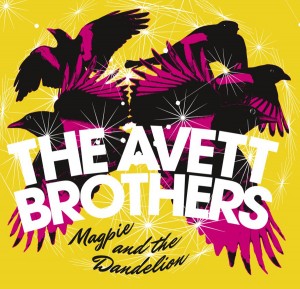Magpie fails to live up to expectations
Coming just 13 months after last September’s The Carpenter, the eighth full-length album by The Avett Brothers, Magpie and the Dandelion, sounds surprisingly different from its predecessor and touches on directly contrasting themes. Though The Carpenter was in many ways a rumination on mortality and growing old, defined by lyrics such as, “When the black cloak drags upon the ground, I’ll be ready to surrender … / If I live the life I’m given, I won’t be scared to die,” the Rick Rubin-produced Magpie is essentially a celebration of youthful wonder.

Fine and dandy · Magpie and the Dandelion, the Avett Brothers’ follow up to 2012’s The Carpenters, takes on a more optimistic tone. – Photo courtesy of American Recordings
Not only can the thematic polarity be heard in the lyrics of the two albums, but also in the music itself: The Carpenter is split between confident, almost jittery rock and soft, timid acoustic songs, echoing every person’s simultaneous passion for life and fear of death, but Magpie and the Dandelion tends toward a fuller, more boisterous sound consistent with youth and enthusiasm. Most of the bluegrass instruments that take the spotlight one at a time in similar bands’ music come all at once in a flurry in Magpie, banjos competing with guitar competing with Bob Crawford’s double bass and Joe Kwon’s deep cello, giving the album a sound that is lively without ever sounding busy. Over it all, Seth and Scott Avett’s unmistakable vocals, unpretentious and clear, complete the burst of twang and emotion that is The Avett Brothers’ music. Fundamentally, the majority of the North Carolina-based brothers’ newest record falls somewhere in between their last album’s punchy alt-country and acoustic Americana folk; full-band ballads abound, complete with twangy banjos and a ragtime-esque piano. Tracks such as “Apart From Me” bring the album down from its energetic roots-rock highs to that soft place where the Brothers do so well.
The album opens strong with “Open Ended Life,” a celebration of the wandering soul that’s colored by fits of bluegrassy strings and a wailing harmonica, and will hold any listener’s attention through the sincere ballads “Morning Song” and “Never Been Alive.” Though similar musically, the two songs are different enough content-wise to remain interesting: the former a melancholy goodbye to someone who “stopped caring,” the latter a hopeful tune about feeling alive and not needing material wealth. Unfortunately, Magpie begins to lose steam after its spunky fourth track, “Another Is Waiting,” and starts to sound a little more like what it actually is: a collection of backup songs recorded during the session with Rubin that created The Carpenter. Just because Magpie contains some second-class songs, though, doesn’t mean it fizzles completely after its more engaging tracks. The powerful, piano-driven “Vanity” turns halfway through from ballad to surprising metal-esque rock, and “Skin and Bones” is the sort of eager, twangy alt-country that fans have come to expect and appreciate from the Avetts, defined by its punchy drums and spirited banjo plucking. Magpie might not be as memorable as The Carpenter, but it still has a lot to offer.
Lyrically, the album falters as its celebration of youth and love falls victim to cliched sentimentality. The otherwise beautiful “Bring Your Love to Me,” for instance, is marred by cheesy lyrics such as, “Bring your love to me / I will hold it like a newborn child / One of my own blood / And I might just even sing a song to keep it calm.” Though Magpie’s love songs such as this one might capture the heart musically, they lack the introspective emotional depth of previous albums and, as a result, end up sounding empty and ordinary. There are still glimpses of the Brothers’ adroit songwriting, however, found in lines such as, “And most of us out there got fooled as the gold, it glittered in the night / And we chased it fast like drunk buffoons / The banker lived, the artist died,” a self-aware commentary on the greed that often strangles the art.
The album is filled out by four demo tracks of other songs off the album, adding to the feeling that Magpie is a half-baked album composed of extra songs from The Carpenter session. In short, the album is instrumentally impressive but underwhelming in comparison to its preceding album, stumbling lyrically into tame, cliched territory. This is not to say, however, that Avett Brothers fans will not thoroughly enjoy the album and that The Avett Brothers are not still an exemplary testament to the possibilities of contemporary folk rock and alt-roots. Rather, Magpie is simply a slightly forgettable addition to the Brothers’ quality repertoire, and music lovers looking for an example of the band’s true potential should look to another album.
